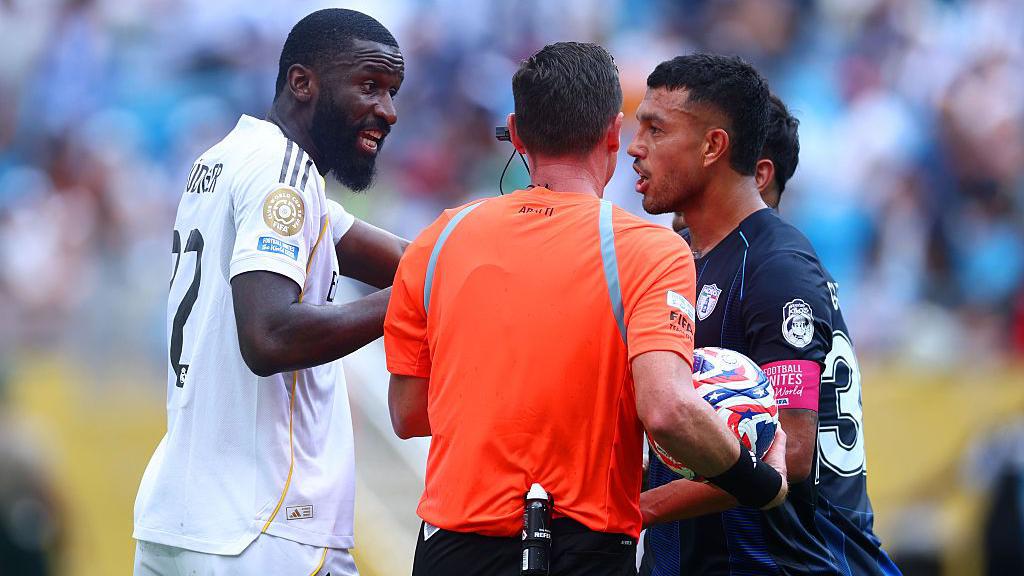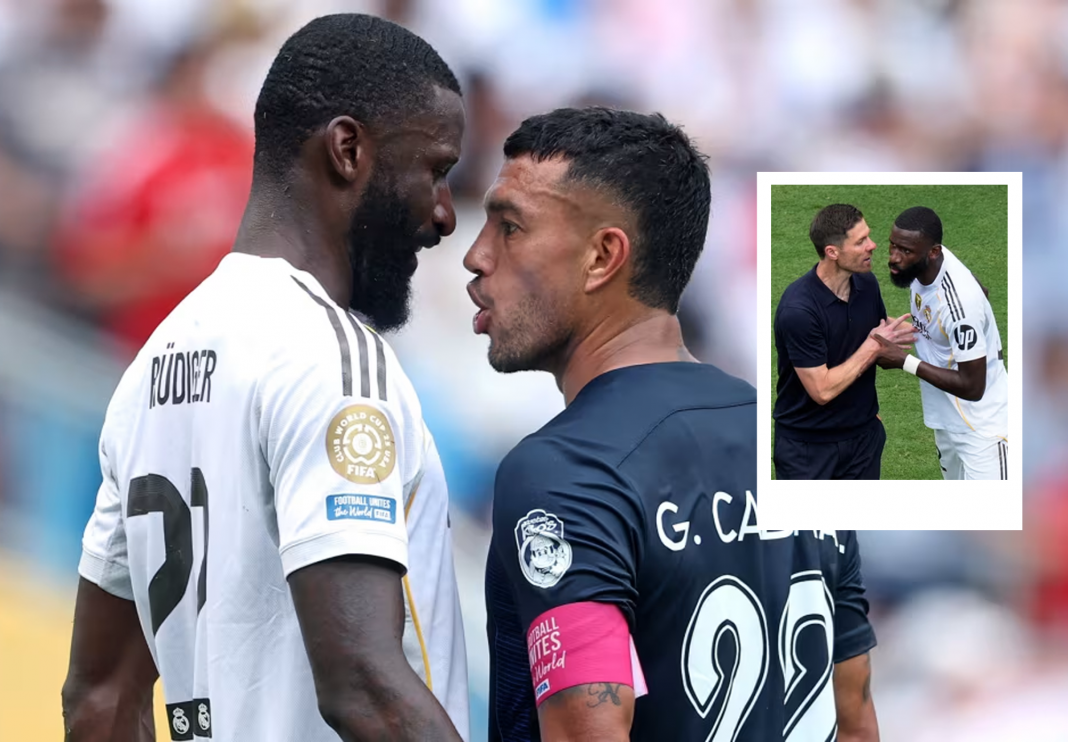Real Madrid manager Xabi Alonso has thrown his full support behind Antonio Rüdiger after the defender accused Pachuca’s Gustavo Cabral of racially abusing him during their FIFA Club World Cup clash. The incident, which unfolded in the closing moments of the match, has sparked a formal investigation by FIFA, shedding renewed light on football’s ongoing struggle with racism both on and off the pitch.
Tensions erupt on the world stage
Sunday’s Club World Cup fixture between Real Madrid and Mexican side Pachuca ended in controversy after a heated altercation between Antonio Rüdiger and Gustavo Cabral. The incident occurred near the end of the game at Bank of America Stadium in Charlotte, North Carolina, with Real Madrid leading 3–1.
The confrontation escalated when Rüdiger, visibly upset, approached the match referee Ramon Abatti and gestured toward Cabral, alleging that the defender had directed a racist insult at him. In response, Abatti made a widely recognized gesture—crossing his arms over his chest—signaling the activation of FIFA’s anti-racism protocol. The gesture, as outlined by FIFA, is the first step in a three-tiered approach designed to address racism on the field.
While the match concluded just moments later with Real Madrid securing victory, the fallout was only beginning. In the post-game press conference, Real Madrid manager Xabi Alonso backed his player unequivocally, stating: “We support Toni and we’ll see what happens. The FIFA protocol has been activated and we support him. It’s unacceptable and we believe what he said. They’re investigating it now.”

Cabral denies allegations amid growing scrutiny
For his part, Gustavo Cabral denied that his exchange with Rüdiger contained racist intent. The 39-year-old Pachuca defender admitted to using an Argentine insult—“cagón de mierda”—which roughly translates to “coward” in vulgar terms, but insisted it was part of common football banter and not racially charged.
“It was a scrap,” Cabral told reporters. “He gets a kick, he said that I hit him with my hand and then there was an argument… It ended a bit hot because as we were going to the dressing room, he was trying to challenge me to a fight… we argued a bit there, nothing more.”Cabral’s comments have not deterred FIFA from taking formal steps to investigate. In a statement to CNN, FIFA confirmed: “Following an assessment of the match reports, the FIFA Disciplinary Committee has opened proceedings against CF Pachuca player Gustavo Cabral in relation to the incident involving him and Real Madrid’s Antonio Rüdiger.”
Meanwhile, Pachuca head coach Jaime Lozano appeared caught off guard. Speaking to the press, he acknowledged that the team had not addressed the incident in the locker room, and he had not yet spoken with Cabral about it. “I cannot give you an explanation about it because this is the first I have heard of this news,” he said, while adding that such behavior would be out of character for Cabral and his players.
Rüdiger’s past battles with racism
For Antonio Rüdiger, the incident is sadly familiar. The German international has long been outspoken about the racism he has endured throughout his career, including during his stints at Chelsea and Real Madrid. In 2021, he penned a powerful essay for The Players’ Tribune titled “This Article Will Not Solve Racism in Football.” In it, he criticized the footballing world’s performative responses to discrimination. “There is an investigation, but nothing really happens,” Rüdiger wrote at the time. “Every once in a while, we have a big social media campaign, and everybody feels good about themselves, and then we go back to normal.”
He questioned why the football community can mobilize quickly against threats like the European Super League, yet consistently falls short when addressing racism. “Tell me,” he asked, “why did the press and the fans and the players all come together to stop the Super League in 48 hours, but when there is obvious racist abuse at a football stadium or online, it is always ‘complicated’? Maybe because it goes a lot deeper.” Rüdiger’s words still resonate today, as football grapples with how to enforce accountability beyond gestures and statements.

A systemic issue demands more than protocol
FIFA’s anti-racism protocol, while a step forward, has repeatedly come under scrutiny for lacking sufficient teeth. The three-step process—pausing the match, warning teams, and potentially suspending the game—is rarely enforced in full. Critics argue that perpetrators often go unpunished, while affected players are left to bear the emotional toll without resolution.
Real Madrid’s decision to publicly back Rüdiger sets an important precedent, reflecting a broader shift toward believing and supporting players who speak out. Yet it also underscores the need for football’s governing bodies to act decisively and transparently.
Whether the FIFA investigation will lead to meaningful disciplinary action remains to be seen. For now, the incident adds another chapter to the long list of racism controversies that continue to mar the world’s most popular sport.
The road ahead
Rüdiger remains one of the few elite players who have consistently and vocally addressed the structural nature of racism in football. His courage to speak out again—and Real Madrid’s willingness to stand by him—may help pressure FIFA into setting a clearer, firmer precedent. As investigations unfold, the footballing world watches closely. Will this be another moment that passes with little more than procedural acknowledgment? Or could it mark the beginning of real accountability in the fight against discrimination on the pitch?
One thing is clear: the conversation isn’t going away, and players like Antonio Rüdiger are making sure of that.





